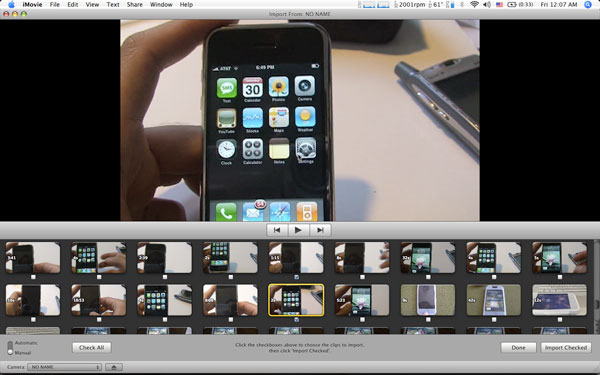
Cut. Print it.
We are driven by our tools much more than we like to think we are.
We like to think that we use the tools. In reality, it is the tools that shape us.
Bob Herbert ran a piece in the NY Times yesterday, “Tweet Less, Kiss More”, which was the usual kvetch about people using texting in the middle of dinner parties or at meetings. Herbert’s piece elicited a couple of hundred comments agreeing that this was the end of civilization as we know it, and we should have blackberry or iPhone free zones, like no smoking areas, or rather iPhone areas, outside buildings and restaurants and so on.
I actually posted a comment disagreeing with the whole premise and extolling how much I like to be online and in touch all the time, a coment which someone at the NY Times took down. Later in the day I was contacted by www.nytpick.com, which seems to be an underground movement of NY Times reporters who don’t exactly seem to like the way things are done over there.
Weird.
In any event this kvetch over the distracting implications of new technology has probably not changed much since the cavemen Grok and Iggoo first complained that their kid was spending entirely too much time with those newfangled stone tools.
We are all very much the product of each successive wave of technology, and as the Borg used to say ‘resistance is futile’, perhaps even stupid.
I am reading Ken Auletta’s terrific new book, Googled, which is required reading, I think, and he pretty much makes this point over and over again.
Howard Stringer and Nobuyuki Idei at Sony both missed the impact that the iPod was going to have, even though they had ridden to success on the back of the Walkman.
Now we are watching the arrival of the iPhone4, which to me is not so much a phone (I have not made or received a voice call in years, really, save a few I could not avoid), but rather a portable video production studio and uploading node. Remarkable really.
Two paragraphs, within a page of each other in Auletta’s new book (pages 206-207 to be precise), left my mind racing.
First page 206:
Seven of the sixteen candidates who ran for president in 2008 announced their candidacies on YouTube…
and then on page 207:
In 2007, Google began to aggressively move to claim a slice of the mobile phone business, which then counted three billion users worldwide – three time the PC market – a number Schmidt [Google CEO] expected to grow by another billion in four years. The success of Apple’s revolutionary iPhone [the first one], with its easy access to the Internet was an eye-opener: the iPhone delivered fifty times more search queries, Google found, than the typical so-called smartphone. A mobile device was no longer just a telephone or a PDA, and portable access to the Internet advanced Google’s interests…
That was in 2007. By 2010, there are an estimated 4.6 billion people with mobile phones.
As Apple has introduced both HD video acquisition and iMovie to their phones, so too will others. This seems inevitable.
And from a phone, you can now not only shoot and edit HD video, you can upload it to anywhere in the world instantly.
This is a new tool.
A powerful new tool.
And if we are smart and look at this thing objectively (and not with the anxiety that Bob Herbert seems subsumed by), what does it tell us about what is going to happen?
It’s the other graph that dovetails so nicely with this one. That now Presidential candidates announce their candidacies on YouTube in video.
Video is our lingua franca.
It’s the way we communicate ideas with one another.
It used to be expensive to produce or broadcast.
It is neither.
And it is now in the hands, or is going to be in the hands very shortly, of 4.6 billion people.
All of whom will have the power to create video content.
All the time.
What does this say about, oh, TV production companies, for example. Or news organizations that send out reporters and camera crews and satellite trucks? Or even movie studios.
Since its inception, video and film have been the few producing for the many.
But now its going to be the many producing for the many.
This is a fundamental change in the way that content is created.
And a fundamental change in who is creating the content.
As with the stone axe, or the iPod, those who can understand what this change means and build an infrastructure that is reflective of it will be wildly successful. Those that continue to cling to the old model will die.
It’s a simple as that.